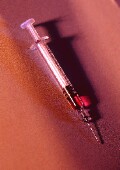- Fragments of Bird Flu Virus Found in 1 in 5 Milk Samples
- Clients Got HIV Through ‘Vampire Facial’ Microneedling Treatments
- Take the Stairs & Step Up to Longer Life
- ‘Drug Take Back Day’ is Saturday: Check for Leftover Opioids in Your Home
- Loneliness Can Shorten Lives of Cancer Survivors
- A Stolen Dog Feels Like Losing a Child, Study Finds
- Healthier Hearts in Middle Age Help Black Women’s Brains Stay Strong
- Better Scans Spot Hidden Inflammation in MS Patients
- Which Patients and Surgeries Are ‘High Risk’ for Seniors?
- Vancomycin May Be Losing Strength Against Common Deadly Infection
Children Benefit From Early Dose of Measles Vaccine, Study Finds


TUESDAY, Oct. 15 Children should receive their first dose of the measles vaccine when they are between 1 year and 15 months old to best avoid the side effects of the shot, according to a new report.
Researchers from Kaiser Permanente Colorado’s Institute for Health Research found that when the first dose of the measles immunization is administered earlier, children have a lower increased risk of fever and seizures. The study is published in the Oct. 14 online edition of JAMA Pediatrics.
“We found that the magnitude of increased risk of fever and seizures following immunization with measles-containing vaccines during the second year of life depends on age,” study lead author, Dr. Ali Rowhani-Rahbar, said in a Kaiser Permanente news release.
“While measles-containing vaccines administered at 12 to 15 months of age are associated with a small risk of fever and seizures following immunization, delayed administration at 16 to 23 months of age results in a greater risk of those adverse events,” Rowhani-Rahbar added.
The U.S. Centers for Disease Control and Prevention recommends that all children receive their first of the two-dose series of measles vaccine at 12 to 15 months of age. But, the researchers pointed out, most children receive their first dose between 12 and 23 months of age, and only 85 percent of children had received this immunization by the time they are 19 months old.
The researchers used data from the Vaccine Safety Datalink to examine the effect of children’s age on their risk for fever and seizures after a measles vaccination. The investigators considered various combinations of vaccines, including: any measles-containing vaccines; the measles, mumps, rubella and varicella vaccine (MMRV); and the measles, mumps and rubella vaccine (MMR) provided with or without a separate varicella vaccine.
After analyzing the records of over 840,000 children aged 12 months to 23 months who received a measles vaccine between 2001 and 2011, the researchers found that after receiving any measles vaccine, all children had an increased risk for fever and seizures seven to 10 days after their immunization. The relative risk of these adverse side effects during this time frame, however, was much lower among those between 12 months and 15 months of age than those between 16 months and 23 months of age.
Rates of fever dropped steadily, however, 12 to 13 days after the first dose of the vaccine for children between 19 months and 23 months of age. Seizures, the study revealed, were most prevalent among children between 16 months and 18 months of age.
The researchers noted that rates of fever and seizures seven to 10 days after the children received their immunization were much higher for those who received the MMRV vaccine than those who received the MMR vaccine with a separate varicella (chickenpox) vaccine.
“Kaiser Permanente’s guidelines for measles-containing vaccines are in line with the CDC’s recommendations,” Dr. Matthew Daley, a pediatrician and senior investigator at Kaiser Permanente Colorado’s Institute for Health Research, said in the news release. “This study’s findings reinforce for parents that these vaccines are safer when children receive them at 12 to 15 months of age.”
Regardless of children’s age when they receive their first dose of the measles vaccine, the researchers pointed out the risk for fever and seizures is still small.
The study’s senior author and co-director of the Vaccine Study Center, Dr. Nicola Klein, pointed out in the news release that “concerned parents should understand that the risk for febrile seizures after any measles-containing vaccine is low — less than one febrile seizure per 1,000 injections.”
Previous studies have also shown that measles vaccines administered to children between 1 year and 23 months of age are associated with an increased risk of fever and seizures one to two weeks after the immunization when the vaccine virus replication is at its peak.
More information
The U.S. Centers for Disease Control and Prevention provides more information on measles vaccination.
Source: HealthDay
Copyright © 2024 HealthDay. All rights reserved.









